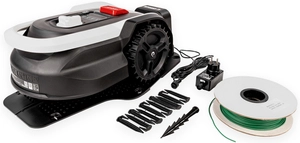Remote Garden Management: Possibilities and Limitations of Automatic Lawn Mowers in the Context of Smart Home

As technology advances, more and more aspects of our home life are becoming automated and connected. One of the most promising examples of this trend is the remote management of the garden using automatic lawnmowers as part of smart home systems (Smart Home). These advanced devices are changing the way we care for our lawns, offering both significant benefits and facing specific limitations.
The capabilities of robotic lawnmowers in smart homes:
1. Automation and convenience
Automatic mowers, which are part of a Smart Home system, can be programmed and controlled remotely using smartphones, tablets or computers. Users can set mowing schedules, adjusting mower settings to specific lawn and weather conditions for optimal care without having to be physically present in the garden.
2. Integration with other devices
These smart devices can work with other components of the Smart Home system, such as weather stations, irrigation and lighting systems. This allows the mower, for example, to automatically stop its work when the irrigation system is active or when rainfall is forecast.
3. Advanced monitoring features
Modern mowers are equipped with sensors that analyze the condition of the lawn and can provide users with detailed information about the needs of their garden. This information can include irrigation levels, grass growth and even detection of weeds and pests.
4. Optimization of energy consumption
Automatic petrol mowers can also contribute to more efficient energy management at home. With the ability to integrate with a home energy management system, the mowers can run during hours when energy is cheaper or when energy production from renewable sources such as solar panels is at its highest level. This not only reduces operating costs, but also promotes a more sustainable use of resources.
5. Adaptation to external conditions
Smart mowers are equipped with systems that allow them to adapt their operation to current weather conditions. For example, they can automatically adjust the cutting height depending on grass moisture and temperature. This adaptive approach not only increases the efficiency of mowing, but also helps to maintain a healthy and aesthetically pleasing lawn all year round.
6. Personalization and programming
Automatic lawn mowers offer a wide range of customization options, allowing users to fine-tune the machine's operation to meet individual garden needs. Programming of the mower can include a variety of mowing patterns that are optimal for different types of lawns, as well as the ability to set priority zones in the garden where the grass needs to be mowed more often. This flexibility makes automatic mowers not only practical, but also a highly adaptable garden tool.
7. Interactive notifications and reports
Thanks to advanced communication technologies, smart mowers can send real-time notifications and reports on lawn status and completed mowing cycles. Users can receive this information directly to their mobile devices, allowing them to monitor the progress of their lawn in real time, as well as respond quickly to any problems, such as the need for additional watering or repairing a damaged area of the lawn.
These advanced capabilities, resulting from the integration of robotic mowers with smart home systems, contribute to increased control, efficiency, and satisfaction in managing the home garden.
Role in sustainable development
Automatic high grass mowers, as part of smart home systems, they also have a significant impact on promoting sustainable development. By effectively managing resources, minimizing chemical interventions on lawns, and reducing carbon footprints, these devices support a green approach to green space care. Integration with Smart Home systems allows for fuller use of renewable energy and reduced waste, resulting in more sustainable homes.
User education and awareness
The key to realizing the full potential of robotic mowers is user education and awareness of their capabilities and limitations. Providers of these technologies should therefore bet on educational campaigns and technical support to help users maximize the benefits of their use. Knowing how to properly configure and maintain these systems is essential to achieving the best results and ensuring long-term satisfaction.
Summary
Automatic lawn mowers in the context of Smart Home offer significant opportunities for users wishing to manage their gardens efficiently with minimal effort. However, like any technology, they are not free of limitations that can affect their functionality and acceptance. The key to maximizing the benefits of these devices is to understand and manage them consciously, allowing you to enjoy a beautifully maintained garden while minimizing potential problems.
Recommended

CEDRUS S3 AUTOMATIC MOW MOWING ROBOT C-MOW 300m2 - OFFICIAL DISTRIBUTOR - AUTHORIZED DEALER CEDRUS

CEDRUS L20+ AUTOMATIC MOWING ROBOT FOR 2000m2 C-MOW - OFFICIAL DISTRIBUTOR - AUTHORIZED DEALER CEDRUS

CEDRUS M5 AUTOMATIC MOW MOWING ROBOT 500m2 - OFFICIAL DISTRIBUTOR - AUTHORIZED DEALER CEDRUS

CEDRUS M10 AUTOMATIC MOW MOWING ROBOT 1000m2 - OFFICIAL DISTRIBUTOR - AUTHORIZED DEALER CEDRUS

CEDRUS L20 AUTOMATIC MOWING ROBOT FOR 2000m2 C-MOW - OFFICIAL DISTRIBUTOR - AUTHORIZED DEALER CEDRUS

CEDRUS M6+ AUTOMATIC MOW MOWING ROBOT 600m2 - OFFICIAL DISTRIBUTOR - AUTHORIZED DEALER CEDRUS

